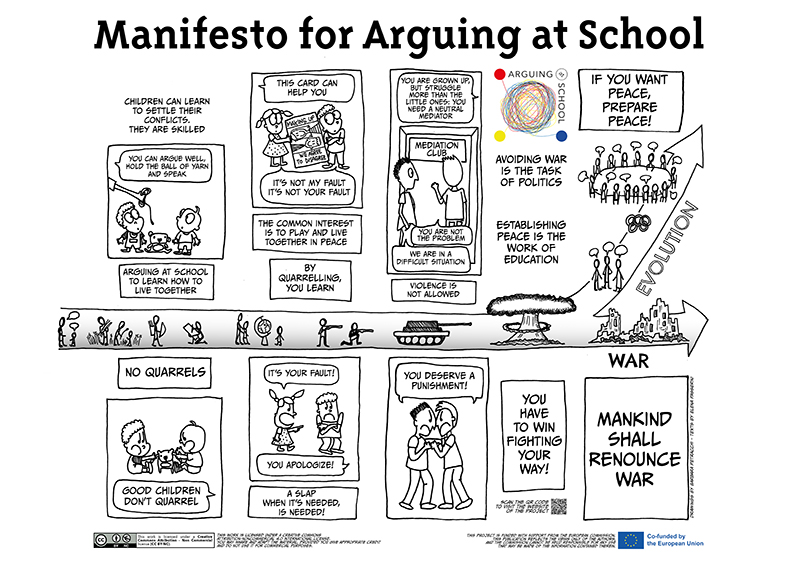by Elena Passerini
The Manifesto for Arguing in School illustrates three developmental ages with their quarrels in three vignettes, top left. In the cartoons are the messages that competent adults give to litigants. There is Daniele Novara’s Litigare bene method, the only one that can be used by very young children, then the Friendship Cards from Relationships Are Forever Foundation in Malta, and finally Peer Mediation, widely practiced by both Croatian partners.
Then a fork in the road appears, marked by the ominous image of the H-bomb, evoking the Bikini test and the 1955 Russell Einstein Manifesto published in the News and partially quoted under the word WAR. Maria Montessori is quoted next to the word EVOLUTION, with minor changes. The reversal of the old mindlessly repeated lie «if you want peace prepare for war» evokes our Policy Recommendations.
To be able to abolish war, the «distasteful limitations of national sovereignty» demanded by Russell, Einstein and the UN are not enough. One should have already begun at an early age to learn how to handle disagreements and difficulties with words, competently, in evolved and intelligent ways. Children, and then young people, can learn to be in conflicts without weapons, without violence, without name-calling, and with the knowledge and confidence that problems are read and dealt with together, for living and playing, without making disasters.
For adults it is more difficult because many of them have received an education that was not properly oriented in the scientific Montessori sense, that is, towards freedom and peace. In many countries people are educated towards war, competition, domination or submission, and individualism. An explicit and implicit education towards violence and war is there.
Violence is a learning, just like nonviolence. War is an institution permitted by politics, not a conflict. Conflicts are inevitable, from childhood, instead, wars can be abolished.
Below the central strip, which recalls some steps in human evolution, are some adults’ beliefs about the experience of arguing and some typical ways of intervening that hinder the development of social skills. Quarrels are a universal experience, common to all, although each person experiences them in his or her way. How do adults react to these events? What do they say? What do they do? What are the results of adults’ inertial responses to children’s quarrels? The vignettes show the ingrained beliefs that many adults carry in their heads, more or less consciously.
And where is the serendipity?
The Manifesto illustrates the results expected in 2021. In the meantime, there has been a crossover with the project financed by the Canton Ticino (Switzerland): the new edition of the interactive exhibition Conflicts, quarrels and other hassles. The theme is the same: quarrels. But instead of comparing different methods to try to make them more transferable, integrated into the whole school approach and less unknown to policymakers, the interactive exhibition is an original tool conceived by Daniele Novara and the CPP staff, touring Italy and systematically used in Ticino schools since 2000, thanks to the work of teachers who propose it to students aged 12 to 14. The 2024 edition features drawings of personalities, including Albert Einstein. And it contains some keywords from the 1955 Manifesto.
There is the English word settlement where almost everyone -except for some- expects to find the solution instead. This gap in meaning is an insight presented in recent news.
They wrote settlement, not the solution, as it is usually translated into Italian. We are used to believing or expecting that conflicts must have a solution, dissolve and disappear like salt in water because they are distasteful. The idea that all problems can and should have a «solution» is an unfounded claim. Many issues have taken centuries or millennia to be solved temporarily, and many problems and conflicts remain unresolved and insoluble. This obsession with a solution, to the point of trying to impose one at any cost, confirms the logic of blame and punishment, the same logic that children absorb like sponges when they are poorly educated in a violent and anti-educational environment that hinders their quarrels by preventing them from learning to live together without violence.
The first sentence of our Manifesto for Arguing at School contains the keyword indicated by Russell: to settle, sistemare. It is perfect for our methods, which are essentially educational settings.A more complete, in-depth study with the same title as this news is being prepared as Project Result 5, unexpected.

Download high-resolution printable versions, available in these languages:
Italian, English, Croatian, Romanian, French, Ukrainian, Russian, Arabic, Hebrew, Slovenian, Serbian, German


